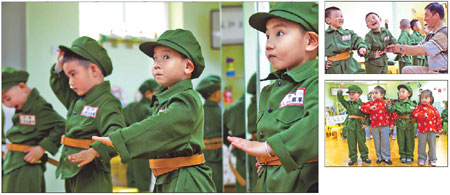Kindergarten kids get to act up in class
Thursday is Xu Hao's fifth-favorite day of the week because that is when the kindergarten pupil gets to play soldiers.
But Xu Hao is no ordinary young student and the soldier he plays is no ordinary soldier but a character in a well-known Peking Opera show. The 5-year-old enjoys dressing in a green costume and learning to sing and act the part of a wounded soldier hiding from the Japanese army in Shajiabang village, Jiangsu province, in 1939.
The boy from Qunying Kindergarten in Fengtai district is particularly fond of the chapter in which he gets to hold a wooden gun. "I look handsome with a gun in hand," he said proudly.
Located 100 meters from Beijing Peking Opera Theater, the kindergarten is taking advantage of its cultural community and has become the first preschool in the capital to introduce Peking Opera into its curriculum.
Since the classes started in 2009, professional artists from the theater have taught 243 students. Class times range from 15 to 40 minutes, depending on students' ages and levels of comprehension.
"We don't aim to cultivate our children to be professional Peking Opera performers, but to be able to appreciate this profound art form," said school principal Fan Jianhua.
Due to the lack of exposure to Peking Opera in childhood, few generations born after 1980 can understand this national cultural treasure, which involves sophisticated pronunciation techniques, and gestures and costumes with symbolic meanings.
Educators have realized that young people are losing interest in this art form and have vowed to revive it. From this year, a trial program of 15 Peking Opera shows will be included in the curriculums of 20 primary and middle schools in the capital.
"Peking Opera classes will enable students to understand and appreciate our national culture," said Wang Jun, director of the sports and arts department of Beijing Education Commission. Wang added that understanding Peking Opera stories, which are mostly adapted from historical events, will give students a sense of right and wrong, integrity and ethics.
However, it can be a challenge to teach young pupils a subject as sophisticated and profound as opera.
To help these 3- to 5-year-olds to understand the lines, Qi Jianguo, an artist from Beijing Peking Opera Theater who also teaches at the kindergarten, translates the classical language into modern everyday language and repeats lines to students hundreds of times so they can comprehend and remember them.
He compares the tunes that commonly appear in Peking Opera to climbing stairs, so students are able to understand and imitate his voice.
Thanks to his efforts, students can put on entire shows. "It is so rewarding to see a child sing an entire chapter," Qi said.
In addition to the designated classes, Peking Opera elements are integrated into every corner of the school. Corridors are decorated with colorful Peking Opera masks that students drew on stones they picked up around the campus. Peking Opera masks and hats made of used plastic bags and bottles hang on the classroom walls.
Even the duty table, which regulates which students help the teacher to clean the classroom, has several Peking Opera masks on the date column, so students can put their name tag under the mask which has their favorite color.
"After several years in these artistic surroundings, students will be very familiar with the art form and that is good for their development," said principal Fan.
At present, teachers at the school are busy planning a big Peking Opera show for Children's Day on June 1. It involves not only children but also teachers and parents.
"Every class will give performances and parents are welcome to join in," Fan said. "It is going to be a big festival."
 0
0 








Go to Forum >>0 Comments